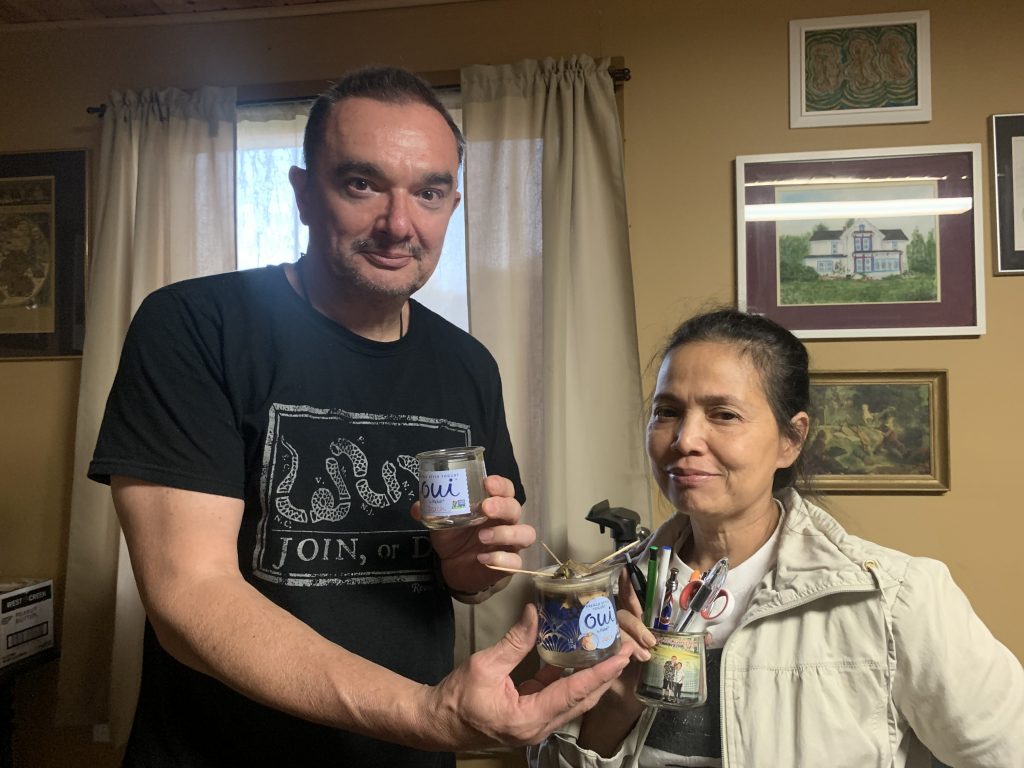During our interview this week, we get to meet with Pascal, who was originally from France and Janet, who was originally from the Philippines. They share the benefits of thinking long term in relation to the concept of sustainability.
What does Sustainability mean to you?
P: “To me, I take it more as being able to sustain yourself, so being able to support yourself. As far as being able to have your own garden, so that you have your own vegetables. You don’t have to go to the store and buy. You have your own vegetables every year. The same thing can be said with water, for example. maybe if you have your own well water all the time, you don’t have to go to the store. Also instead of buying Kleenex that you have to buy and waste every time, you can use a handkerchief. This way you can wash and reuse them again. Not wasting can be sustainable, like using toothpaste that’s not in a plastic container. A lot of this thinking is like, tomorrow if there is an apocalypse and you’re stuck at home, will you be able to survive and support yourself. That’s all about sustaining yourself.”
Why does it matter?
J: “It matters because you save money and you save the earth.”
P: “In some ways I think it’s healthier for you. Obviously if you grow your own food and you have your own chicken and eggs, and this and that, obviously you’re saving money and you’re saving your health long term. That way you don’t have to go see a doctor as much because you probably have a less of a chance to get sick. Another example: if you get solar panels to make your own electricity, then you don’t depend on somebody. Instead of a power plant, you have your own, either solar panel or windmill, so you don’t burn fuel. If you have too much energy, I think you can sell it back. If they world goes to chaos and there is a power shutdown, you have your own electricity.
While climate change is not an apocalypse, it is a real and serious global crisis. For some, having to uproot their entire lives away from a community or land that they’ve always known is a current reality. With rising sea levels and an increase in the frequency of extreme weather events, over 140,000 million migrants are expected to be displaced from climate change related disasters by the year 2050.
Are there any practices that you implement in your everyday life to make it more sustainable? If so, what are they?
P: “For the food that I grow, I think of a plan of vegetables I may need and which vegetables that I can store, whether I can them, freeze them, or dry them. That way I’ve got vegetables all year long. When fall and winter come, I don’t need to depend on buying from the store as much. You can make a lot of your own things like your own vinegar, your own wines, and as you get better as it, you may be able to do more. Then you don’t have to go shopping. Same with clothes. Many people have a tendency to buy clothes that are the better deal, but if you buy something that’s more expensive and more durable, it will likely last much longer. Then you don’t have to keep shopping as often. Instead of buying a jacket every two years because it was make quickly and cheaply, you can get one that’s a hundred bucks, but you have it for the next ten years. It might be out dated, but it’s sustainable.”
J: “In the Philippines, we always grow gardens. And we have animals like pigs, chickens, cows. In a year we have one or two of each. The reason is we always have fresh food. In order to sustain yearly, I contributed to the government. The government would give it back to the farmers. They’d come with the rice, milk, bread, and other beverages. I’ve made my own soap before too. During the war, my mother sustained herself by doing these things. Right now I reuse glass yogurt jars. there are multiple uses that I can imagine. You could use cloth, wrapping paper, a wire, a cord, or a lace around it from some bling-bling. You can use it for decoration. I even put photographs in it sometimes as a frame.”
P: “The first few years I was with her, I noticed that they would save the wrapping paper. They would unwrap it very carefully, then fold it up and save it so she could reuse it the next year. I mean, we just wrapped it off, but when I saw that it was like, wow, yeah, save the paper. That’s one thing I was that wow, that’s a good idea.”
What barriers do you think there are for individuals or society for not switching to more sustainable methods of living?
J: “Technology because it’s been easy, like online shopping. So the convenience of technology.”
P: “Maybe more education. I think if people were more educated about sustaining themselves. I don’t even know if they teach you in school how to grow things or how to recycle water if your well gets contaminated, like boiling the water. And obviously finances. Can you buy a two thousand dollar windmill? No because it’s thousand dollars. So I would say I’m going to have to keep using the gas company. I would say both at the same level: education and finances. If I could, I would have put a solar panel on the roof ten years ago, but it’s so expensive. It’s that initial money down. In the next ten years when it’s paid for, then the next few decades of your life it’s okay. But it’s that first bit that would be tight.”

Leave a Reply